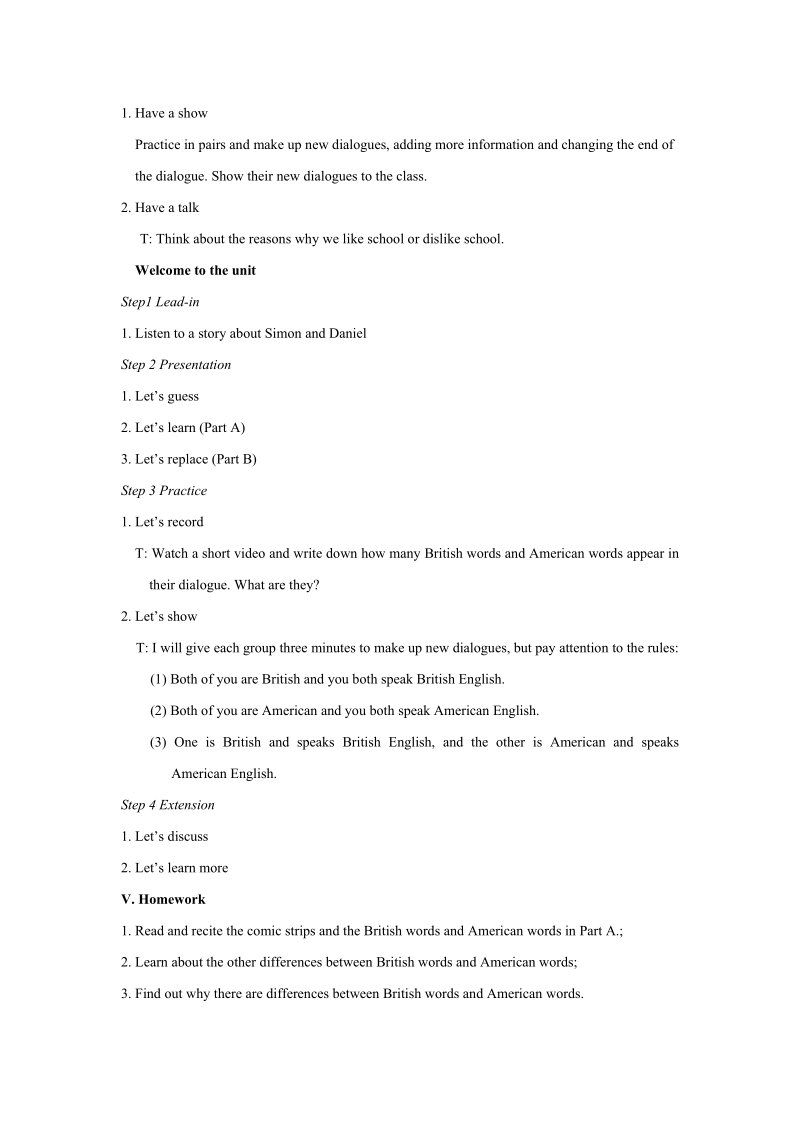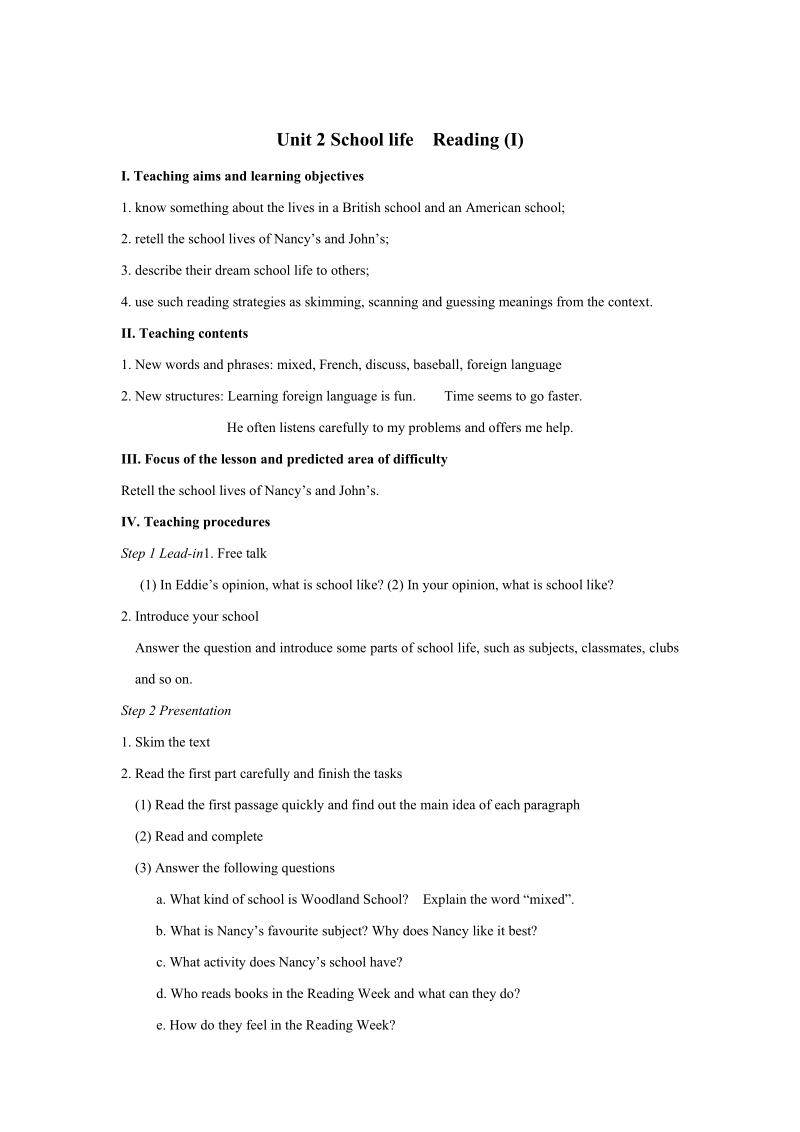 2019年秋牛津译林版八年级英语上册Unit2全英文教案
2019年秋牛津译林版八年级英语上册Unit2全英文教案
《2019年秋牛津译林版八年级英语上册Unit2全英文教案》由会员分享,可在线阅读,更多相关《2019年秋牛津译林版八年级英语上册Unit2全英文教案(14页珍藏版)》请在七七文库上搜索。
1、Unit 2 School life Comic strip 2. grasp the different expressions to refer to the same thing in British and American English;3. understand the rules of the differences between British and American English in vocabulary.II. Teaching contents1. New words and phrases: British, biscuit, rubber, American
2、, eraser, vacation, cookie, fall, store, truck, yard, movie, advertisement, lorry, soccer2. New structures: Because were cleverer than people. They have to work harder. Whats school life? Its like watching TV. There are fewer advertisements. Id love to, but the school football team will practise thi
3、s Saturday. III. Focus of the lesson and predicted area of difficulty1. Describe what school is like in their mind with ones own words;2. Remember which words are the British words and which are the American words.IV. Teaching proceduresComic stripStep 1 Lead-in Free talkWhich part of our school do
4、you like best? Why?What activities can we do in our school? Which do you like better about school, the lessons or the after-school activities? Do you think school is fun? Why or why not? Step 2 Presentation 1. Teach a new wordadvertisement2. Listen to the conversation between Eddie and Hobo and answ
5、er the questions belowT: Now lets see what our old friend Eddie thinks of school? Why does Eddie think dogs dont go to school? What does Eddie think of school?3. Ask students to read the dialogue together first and then in different roles4. Complete the short passage according to the dialogueStep 3
6、Extension1. Have a showPractice in pairs and make up new dialogues, adding more information and changing the end of the dialogue. Show their new dialogues to the class. 2. Have a talkT: Think about the reasons why we like school or dislike school. Welcome to the unitStep1 Lead-in 1. Listen to a stor
7、y about Simon and DanielStep 2 Presentation 1. Lets guess2. Lets learn (Part A)3. Lets replace (Part B)Step 3 Practice1. Lets recordT: Watch a short video and write down how many British words and American words appear in their dialogue. What are they?2. Lets showT: I will give each group three minu
8、tes to make up new dialogues, but pay attention to the rules: (1) Both of you are British and you both speak British English. (2) Both of you are American and you both speak American English. (3) One is British and speaks British English, and the other is American and speaks American English. Step 4
9、 Extension 1. Lets discuss2. Lets learn moreV. Homework1. Read and recite the comic strips and the British words and American words in Part A.;2. Learn about the other differences between British words and American words;3. Find out why there are differences between British words and American words.
10、 Unit 2 School life Reading (I)I. Teaching aims and learning objectives1. know something about the lives in a British school and an American school;2. retell the school lives of Nancys and Johns;3. describe their dream school life to others;4. use such reading strategies as skimming, scanning and gu
11、essing meanings from the context.II. Teaching contents1. New words and phrases: mixed, French, discuss, baseball, foreign language2. New structures: Learning foreign language is fun. Time seems to go faster.He often listens carefully to my problems and offers me help.III. Focus of the lesson and pre
12、dicted area of difficultyRetell the school lives of Nancys and Johns.IV. Teaching proceduresStep 1 Lead-in1. Free talk(1) In Eddies opinion, what is school like? (2) In your opinion, what is school like? 2. Introduce your schoolAnswer the question and introduce some parts of school life, such as sub
13、jects, classmates, clubs and so on.Step 2 Presentation1. Skim the text2. Read the first part carefully and finish the tasks(1) Read the first passage quickly and find out the main idea of each paragraph(2) Read and complete(3) Answer the following questionsa. What kind of school is Woodland School?
14、Explain the word “mixed”. b. What is Nancys favourite subject? Why does Nancy like it best?c. What activity does Nancys school have? d. Who reads books in the Reading Week and what can they do? e. How do they feel in the Reading Week? (4) Listen and repeat(5) Try to retellStep 3 Consolidation1. Lets
15、 compareUse the following table to compare the two different kinds of school lives.Country Students name School Grade ActivityNancy WoodlandSchool Year 8 favouritesubject( what、 why)Reading Week( what、 how)John Rocky Mountain High School The8thgrade the Buddy Club( what、 who)favouritesport( what、 wh
16、o、 when)2. Have a discussion Create a situation and let the students discuss in pairs. “If you have a chance (机会) to study in a British school or an American school, which school will you choose? Why?” V. Homework1. Read the text after the tape three times;2. Talk about your dream school life to you
17、r classmates. Unit 2 School life Reading (II)I. Teaching aims and learning objectives1. get further understanding of the two passages by comparing Nancys and Johns schools;2. learn how to use some important words correctly properly; 3. write a short passage about special school activities in our own
18、 school;4. activate the students awareness of enjoying their school by talking about their ideal school life. II. Teaching contents1. New words and phrases: mixed, French, foreign, language, during the week, discuss sth. with sb., buddy, offer sb. help, end, play baseball2. New structure: It is a mi
19、xed school. Among all the subjects, I like French best. Learning foreign languages is fun. I often read more books than my classmates. Near the end of the week, we discuss the books with our classmates in class. On Friday afternoon, our school ends earlier than usual. III. Focus of the lesson and pr
20、edicted area of difficultyLearn how to use these important words properly. IV. Teaching proceduresStep 1 Lead-in1. Show a short video about school life and then ask students some questions(1) What did the boy Greg and his friend Rowley want to do?(2) What problem did they have?(3) What do you think
21、of their school life?(4) What do you think of the other students in the video? 2. Lets reviewPlease fill in the table with right details according to the two short passages in Reading. (Keys: British; Rocky Mountain High School; London; mixed; French; the Reading Week; the Buddy Club; foreign langua
22、ges is fun; seems to go faster when we are reading interesting books; won two games last month)Step 2 Presentation1. Lets retell T: Youre great! But who can retell the short passages with the information in the table. 2. Explain the word “mix” 3. Explain “discuss” 4. Explain the word “buddy” and “of
23、fer”5. Explain the word “end”Step 3 Practice1. Show a picture of Nancy and ask students some questions:T: Do you know the words on the blackboard? (I love Paris.)What language do the words in Line 1 belong to? (French)2. Do you know what John thinks is great fun? (Playing baseball.)Step 4 Consolidat
24、ion1. Complete the passage 2. Writing3. Speaking outTalk about their ideal school lives. (Showing some pictures) V. Homework1. Read the passage fluently;2. Write an article about your ideal school life;3. Search the Internet for more information about school lives in other countries.Unit 2 School li



- 配套讲稿:
如PPT文件的首页显示word图标,表示该PPT已包含配套word讲稿。双击word图标可打开word文档。
- 特殊限制:
部分文档作品中含有的国旗、国徽等图片,仅作为作品整体效果示例展示,禁止商用。设计者仅对作品中独创性部分享有著作权。
- 关 键 词:
- 2019 牛津 译林版八 年级 英语 上册 Unit2 英文 教案
 七七文库所有资源均是用户自行上传分享,仅供网友学习交流,未经上传用户书面授权,请勿作他用。
七七文库所有资源均是用户自行上传分享,仅供网友学习交流,未经上传用户书面授权,请勿作他用。



 浙公网安备33030202001339号
浙公网安备33030202001339号
链接地址:https://www.77wenku.com/p-82059.html